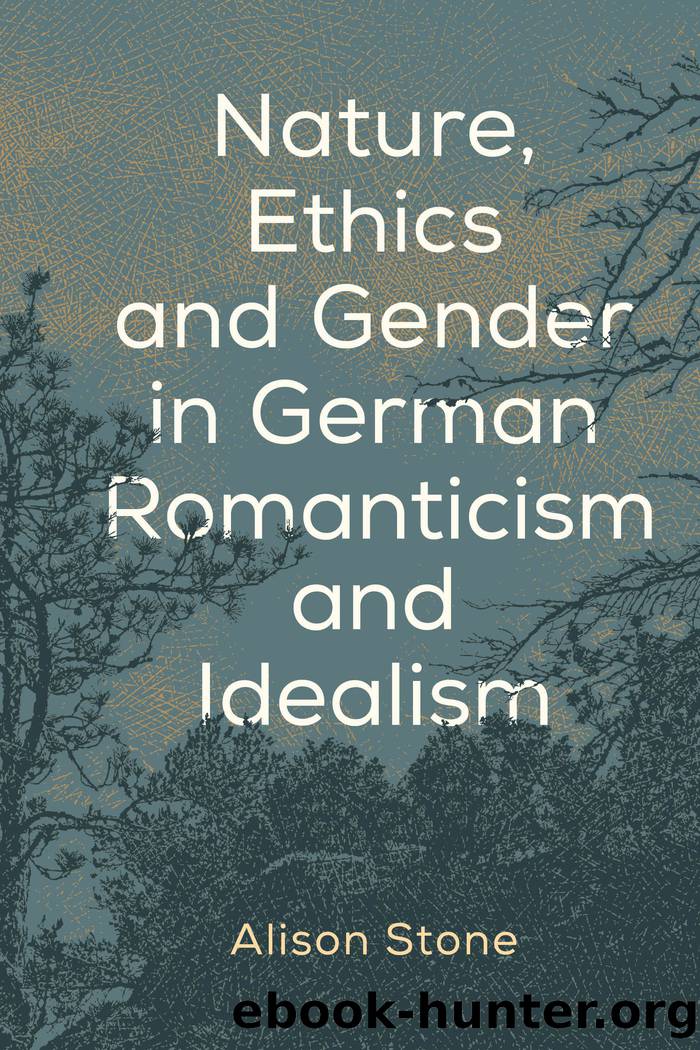Nature, Ethics and Gender in German Romanticism and Idealism by Stone Alison;

Author:Stone, Alison;
Language: eng
Format: epub
Tags: undefined
Publisher: Rowman & Littlefield Unlimited Model
Published: 2012-08-15T00:00:00+00:00
8. Liebig, as quoted in Beiser (2002: 507). The source of the quotation is Liebig (1874: 24).
9. On Humboldtâs view of nature, see also Millán-Zaibert (2009).
10. Consequently, Humboldt was willing to affiliate himself with Philosophy of nature, in a letter of 1836 (see 1997: xvi), provided that this meant arranging data in light of rational ideas, not vainly trying to deduce data from ideas.
Chapter 8
Hegel, Naturalism and the Philosophy of Nature
In this chapter I consider whether Hegel is a naturalist or an anti-naturalist with regards to his philosophy of nature. Rather than approaching Hegel on the assumption that naturalism and anti-naturalism are polar opposites, I suggest that we can make better sense of Hegelâs view of nature by adopting a cluster-based approach to naturalism. On this approach, positions are more or less naturalistic depending how many strands of the cluster naturalism they exemplify, and how thoroughly they exemplify these strands. Following Finn Spicer, I suggest that the strands of the cluster naturalism include belief that philosophy is continuous with the sciences and denial of the existence of any supernatural entities or processes. I assess Hegelâs position with respect to these two strands.
As I will explain, methodologically, Hegel maintains that philosophy of nature is continuous with the empirical sciences insofar as philosophers of nature begin by learning from scientists about natural forms. Philosophers of nature then reconstruct scientific accounts of these natural forms on an a priori basis, thereby establishing how these natural forms are organised into a rationally connected chain. In the process, though, philosophers of nature also reinterpret these natural forms in light of a metaphysics according to which nature is a rational whole. Hegel explicitly says that this metaphysics is distinct from that of empirical science. Even so, Hegel also thinks that this metaphysics only makes explicit a presupposition â that nature is an organised whole admitting of rational comprehension â that scientists implicitly hold all along, and must hold if their inquiries are to have any motivation. Methodologically, then, Hegel regards philosophy of nature and empirical science neither as discontinuous from nor entirely continuous with one another, but somewhere between the two. In terms of his stance on the philosophy-science relation, he belongs in the middle of the spectrum that runs from the most naturalistic to the most anti-naturalistic positions.
Turning to rejection of supernatural entities and processes, we can again identify a spectrum of positions here. At the naturalistic end of the spectrum, mechanistic materialists regard nature as composed entirely of units of matter in efficient-causal relations. Somewhat less naturalistic, Kant maintains that we may legitimately postulate final and formal causes within nature â specifically in the form of the ground-plans that animate purposive wholes â as long as we do not ascribe real, mind-independent existence to these ground-plans or purposes. Less naturalistic again, Schelling maintains that we may legitimately postulate really existing final and formal causes in nature as long as we do so in ways that recognise the pervasiveness of mechanism in nature and that
Download
This site does not store any files on its server. We only index and link to content provided by other sites. Please contact the content providers to delete copyright contents if any and email us, we'll remove relevant links or contents immediately.
| Aeronautics & Astronautics | Astronomy |
| Astrophysics & Space Science | Comets, Meteors & Asteroids |
| Cosmology | Mars |
| Solar System | Star-Gazing |
| Telescopes | UFOs |
Tools of Titans by Timothy Ferriss(7807)
Turbulence by E. J. Noyes(7697)
Astrophysics for People in a Hurry by Neil DeGrasse Tyson(4999)
Secrets of Antigravity Propulsion: Tesla, UFOs, and Classified Aerospace Technology by Ph.D. Paul A. Laviolette(4984)
Design of Trajectory Optimization Approach for Space Maneuver Vehicle Skip Entry Problems by Runqi Chai & Al Savvaris & Antonios Tsourdos & Senchun Chai(4837)
Room 212 by Kate Stewart(4732)
Pale Blue Dot by Carl Sagan(4613)
The David Icke Guide to the Global Conspiracy (and how to end it) by David Icke(4376)
A Journey Through Divination and Astronomy by Publishing Pottermore(4248)
Apollo 8 by Jeffrey Kluger(3511)
Goodbye Paradise(3442)
Losing the Nobel Prize by Brian Keating(3424)
COSMOS by Carl Sagan(3346)
The Five People You Meet in Heaven by Mitch Albom(3334)
Brief Answers to the Big Questions by Stephen Hawking(3239)
How to Read Water: Clues and Patterns from Puddles to the Sea (Natural Navigation) by Tristan Gooley(3236)
How to Read Nature by Tristan Gooley(3073)
The Order of Time by Carlo Rovelli(3073)
A Brief History of Time by Stephen Hawking(2819)
